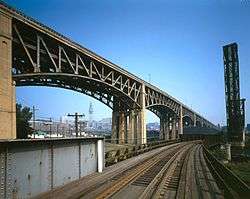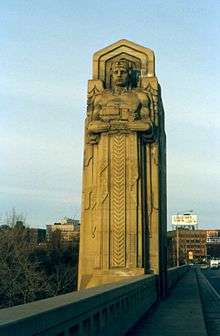Hope Memorial Bridge
| Hope Memorial Bridge | |
|---|---|
 The Lorain–Carnegie Bridge in 1988 | |
| Coordinates | 41°29′22″N 81°41′37″W / 41.489407°N 81.693554°WCoordinates: 41°29′22″N 81°41′37″W / 41.489407°N 81.693554°W |
| Carries |
|
| Crosses | Cuyahoga River |
| Locale | Cleveland, Ohio |
| Characteristics | |
| Design | Art deco truss bridge |
| Total length | 1,368.55 meters (4,490.0 ft)[1] |
| Longest span | 69.80 meters (229.0 ft)[1] |
| Clearance below | 28.3 meters (93 ft) |
| History | |
| Construction end | 1932 |
|
Lorain-Carnegie Bridge | |
   | |
| Location | Spans Cuyahoga River between Lorain and Carnegie Aves., Cleveland, Ohio |
| Coordinates | 41°29′22″N 81°41′37″W / 41.489407°N 81.693554°W |
| Area | 8.5 acres (3.4 ha) |
| Built | 1927 |
| Architectural style | Art Deco, cantilever deck truss bridge |
| NRHP Reference # | 76001398[2] |
| Added to NRHP | October 8, 1976 |
The Hope Memorial Bridge (formerly the Lorain–Carnegie Bridge) is a 5,865-foot-long (1,788 m) art deco truss bridge crossing the Cuyahoga River in Cleveland, Ohio. The bridge connects Lorain Avenue on Cleveland's west side and Carnegie Avenue on the east side, terminating just short of Progressive Field. Pairs of statues designed by sculptor Henry Hering and architect Frank Walker – titled the "Guardians of Transportation" – stand on pylons at each end of the viaduct, symbolizing progress in transportation.[3]
History
A bond issue to pay for the bridge was passed in 1921, but construction was delayed for years due to squabbles over how the money would be spent. The bridge was completed in 1932 at a cost of $4.75 million ($82,520,000 with inflation[4]). It stands 93 feet (28 meters) above the river's waterline in order to allow shipping to pass unobstructed. A second, lower deck designed to carry truck and commercial traffic was never put into service.

The bridge was listed in the National Register of Historic Places on October 8, 1976, after a controversy in which county engineer Albert S. Porter threatened to remove the historic pylons to widen the span, stating, "Those columns are monstrosities and should be torn down and forgotten. There is nothing particularly historic about any one of them. We're not running a May Show here."[5] The bridge was renovated in the early 1980s. On September 1, 1983, the Lorain–Carnegie bridge was officially renamed the "Hope Memorial Bridge"; initial reports claimed the new name was chosen in honor of William Henry "Harry" Hope, a local stonemason who helped build the "Guardians of Transportation" sculptures, and the father of comedian and former Cleveland resident Bob Hope.[6] In the years since the dedication, however, claims have varied as to who exactly the bridge's name honors. Some have claimed the bridge was renamed specifically for Bob Hope;[7] others the entire Hope family;[8] and still others have claimed it recognizes Harry Hope along with the other workers who helped erect the giant concrete pylons.[9]
On December 10, 2012, officials opened a 14.5-foot-wide (4.4 m) multi-use path on the north side of the bridge, part of a project which will also add lighting to the Guardians of Transportation.[10]
A pair of peregrine falcons nest under the bridge.[11]
See also
References
- 1 2 Lorain–Carnegie Bridge at Structurae
- ↑ National Park Service (2010-07-09). "National Register Information System". National Register of Historic Places. National Park Service.
- ↑ "Icons of Cleveland: The Guardians of Traffic". Cleveland Magazine, August 2009. Retrieved 2012-05-30.
- ↑ Federal Reserve Bank of Minneapolis Community Development Project. "Consumer Price Index (estimate) 1800–". Federal Reserve Bank of Minneapolis. Retrieved October 21, 2016.
- ↑ Snook, Debbi (2002-12-02). "Bridges [sic] of Hopes". The Plain Dealer. Retrieved 2008-02-19.
- ↑ Thoma, Pauline (September 2, 1983). "Lorain-Carnegie span is new Hope". The Plain Dealer.
The ceremony drew a large contingent of the family of Bob Hope's father, Harry, one of the stonecutters who created the four gigantic pylons, and the man for whom the bridge is now named.
- ↑ Congressional Record (May 21, 2002) – Rep. Dennis Kucinich: "The city of Cleveland claims [Bob Hope] as one of their favorite sons and has named a major bridge after him..."
- ↑ Cuyahoga County: The First 200 years (2011 book) - "... renamed the Hope Memorial Bridge in honor of the family of comedian and actor Bob Hope"
- Rotman, Michael. "Lorain-Carnegie Bridge". ClevelandHistorical.org. Archived from the original on July 15, 2011.
The bridge was renamed at this time, becoming the Hope Memorial Bridge, in honor of actor Bob Hope and his family...
- Rotman, Michael. "Lorain-Carnegie Bridge". ClevelandHistorical.org. Archived from the original on July 15, 2011.
- ↑ Dawidziak, Mark; and Feran, Tom (July 29, 2003). "Bob Hope: Entertainer always had a place in his heart for Cleveland". The Plain Dealer.
He did not return in September 1983 for ceremonies re-dedicating the renovated Lorain-Carnegie Bridge as the Hope Memorial Bridge, in honor of Hope's father and other stonemasons who carved its massive stone pylons and eight 'Guardians of Traffic' figures.
- ↑ "Lorain–Carnegie (Hope Memorial) Bikeway Opened Today (press release)". Ohio Department of Transportation District 12. 2012-12-10. Retrieved 2012-12-11.
- ↑ Warsinskey, Tim (August 26, 2015). "Biking the Ohio & Erie Canal Towpath Trail from Cleveland to New Philadelphia, Day 1". The Plain Dealer via Cleveland.com. Advance Ohio. Retrieved July 28, 2016.
... a trio of veteran bird watchers had binoculars and cameras aimed at a peregrine falcon nest under the Hope Memorial (Lorain-Carnegie) Bridge.
External links
| Wikimedia Commons has media related to Lorain-Carnegie Bridge. |
- Lorain–Carnegie Bridge (Cleveland Memory)
- Hope Memorial Bridge (Encyclopedia of Cleveland History)
- Hope Memorial Bridge at HLNEO